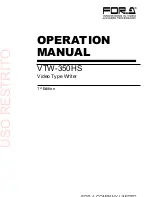
22 | SAMLEX AMERICA INC.
SECTION 7 |
General Information on Lead Acid
Batteries
TABLE 7.4: STATE OF CHARGE VERSUS STANDING VOLTAGE
Percentage of
Full Charge
Standing
Voltage of
Individual Cells
Standing
Voltage of
12V Battery
Standing
Voltage of
24V Battery
Standing
Voltage of
48V Battery
100%
2.105V
12.63V
25.26V
50.52V
90%
2.10V
12.6V
25.20V
50.40V
80%
2.08V
12.5V
25.00V
50.00V
70%
2.05V
12.3V
24.60V
49.20V
60%
2.03V
12.2V
24.40V
48.80V
50%
2.02V
12.1V
24.20V
48.40V
30%
1.97V
11.8V
23.60V
47.20V
20%
1.95V
11.7V
23.40V
46.80V
10%
1.93V
11.6V
23.20V
46.40V
0%
= / < 1.93V
= / < 11.6V
= / < 23.20V
= / < 46.40V
Check the individual cell voltages / specific gravity. If the inter cell voltage difference is
more than a 0.2V, or the specific gravity difference is 0.015 or more, the cells will require
equalization. Please note that only the non-sealed / vented / flooded / wet cell batteries
are equalized. Do not equalize sealed / VRLA type of AGM or Gel Cell Batteries.
7.10 STATE OF DISCHARGE OF A LOADED BATTERY – LOW BATTERY /
DC INPUT VOLTAGE ALARM AND SHUTDOWN IN INVERTERS
Most inverter hardware estimate the State of Discharge of the loaded battery by measur-
ing the voltage at the inverter’s DC input terminals (considering that the DC input cables
are thick enough to allow a negligible voltage drop between the battery and the inverter).
Inverters are provided with a buzzer alarm to warn that the loaded battery has been
deeply discharged to around 80% of the rated capacity. Normally, the buzzer alarm is
triggered when the voltage at the DC input terminals of the inverter has dropped to
around (i) 10.5V for a 12V battery, (ii) 21V for 24V battery or, (iii) 42V for 48V battery at
C-Rate discharge current of C/5 Amps and electrolyte temp. of 80°F. The inverter is shut
down if the terminal voltage at C/5 discharge current falls further to (i) 10V for 12V bat-
tery, (ii) 20V for 24V battery or (iii) 40V for 48V battery.
The State of Discharge of a battery is estimated based on the measured terminal voltage
of the battery. The terminal voltage of the battery is dependent upon the following:
- Temperature of the battery electrolyte: Temperature of the electrolyte affects the
electrochemical reactions inside the battery and produces a Negative Voltage
Coefficient – during charging / discharging, the terminal voltage drops with rise in
temperature and rises with drop in temperature
- The amount of discharging current or “C-Rate”: A battery has non linear internal
resistance and hence, as the discharge current increases, the battery terminal voltage
decreases non-linearly
Содержание PST-60S-48E
Страница 47: ...SAMLEX AMERICA INC 47 NOTES...















































